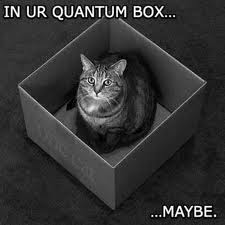Saturday, November 19, 2011
Tao Of Physics
Discussion continues
June, ’80
"The observer-generated reality stuff,” said Jade, “is just
another aspect of how phenomena manifests at the quantum
level. The classical notions of space, time, and
causality--objective reality, break down at the quantum level.
Remember there are no waves propagating. According to most physicists,
the wave function is not quite a thing, it is more like an idea that
occupies a strange middle ground between idea and reality, where all
things are possible but none are actual. An electron is not a particle
either, it is more like a process, always forming, always dissolving.
It can't be detected until it interacts with a measuring device and
even if it does interact we don't know if it interacts with the device
per se, or if it interacts with the last link in the chain of events
that define the experiment—the consciousness of the human observer."
"Fellows," Don interjected, "you ain't seen nothing till you've seen
an elephant fly! Come Saturday night--those dissolving particles
ain't got nothing on my vanishing elephants. If you want to see those
mouse hating critters pop out of existence all you have to do is close
down a couple bars with me."
"That's interesting Don; I mean that you should bring up a vanishing
act to illustrate your point," Jade replied, "because the physicist,
Erwin Schrodinger devised a thought experiment that kind of
illustrates his point with a similar vanishing act, only he wasn't
talking about mice haters, he was talking about mice lovers. According
to Schrodinger, if you put a cat in a box with some poison gas and
release the gas the cat dies. But here's the catch, for Schrodinger
the gas release is triggered by radiation decay, which is a random
occurrence. In classical physics, the cat dies at the time of the
decay, but in quantum mechanics the cat dies when the observation is
made, when the last link in the chain of events that defines the
experiment occurs. At the time of observation when the box is opened
the wave function collapses and possibility becomes actuality. Of
course, common sense tells us that can't be true, but that's precisely
the point, common sense breaks down at the quantum level, things are
`different' at that level. So the question remains, `Is it, or when is
it, necessary to include human consciousness in our descriptions of
the world?' Or, put another way, `what role does measurement play in
an experiment?' Does it provide a description of the world under study
or does it actually create that world?' Quantum Mechanics has a hard
time answering questions like that."
"I'm out of beer," said Don, "Anybody got an extra one?"
"Maybe one day that situation will be better understood," I said. "But
until that day comes, talk about `objectivity' is probably best left
to the Buddhists. They don't have a problem with `independent reality'
because for them there isn't any. For them, everything is
co-dependent. My subjective world, and the objective world, is, for an
enlightened Buddhist, just words referring to mutually conditioned
relations woven into one fabric. For the Buddhist, subject and object
are not just inseparable, they are indistinguishable."
Subscribe to:
Post Comments (Atom)







No comments:
Post a Comment